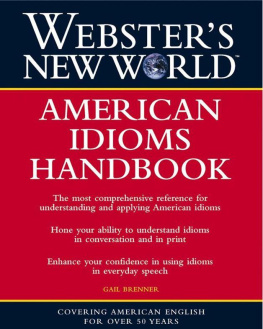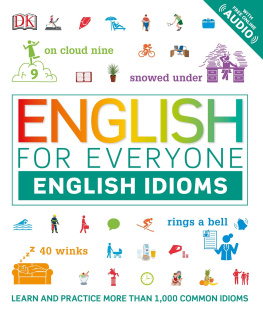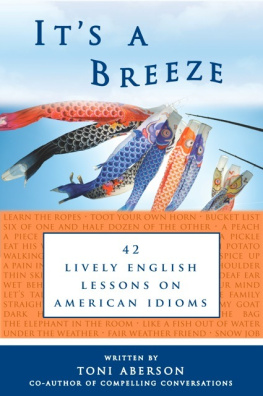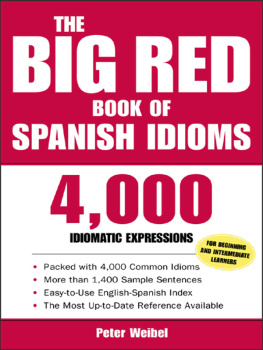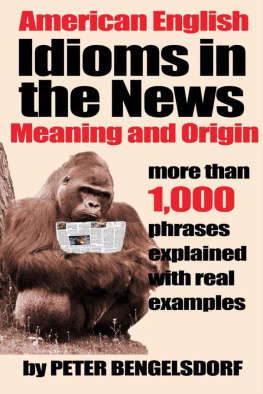CONTENTS

Websters New World American Idioms Handbook
Copyright 2003 by Wiley Publishing, Inc., Indianapolis, Indiana
Published by Wiley Publishing, Inc., Indianapolis, Indiana
Published simultaneously in Canada
No part of this publication may be reproduced, stored in a retrieval system or transmitted in any form or by any means, electronic, mechanical, photocopying, recording, scanning or otherwise, except as permitted under Sections 107 or 108 of the 1976 United States Copyright Act, without either the prior written permission of the Publisher, or authorization through payment of the appropriate per-copy fee to the Copyright Clearance Center, 222 Rosewood Drive, Danvers, MA 01923, (978) 750-8400, fax (978) 646-8700. Requests to the Publisher for permission should be addressed to the Legal Department, Wiley Publishing, Inc., 10475 Crosspoint Blvd., Indianapolis, IN 46256, (317) 572-3447, fax (317) 572-4447, E-mail: .
Trademarks: Wiley, the Wiley Publishing logo, Websters New World, and the Websters New World logo are trademarks or registered trademarks of Wiley Publishing, Inc., in the United States and other countries, and may not be used without written permission. All other trademarks are the property of their respective owners. Wiley Publishing, Inc., is not associated with any product or vendor mentioned in this book.
Limit of Liability/Disclaimer of Warranty: While the publisher and author have used their best efforts in preparing this book, they make no representations or warranties with respect to the accuracy or completeness of the contents of this book and specifically disclaim any implied warranties of merchantability or fitness for a particular purpose. No warranty may be created or extended by sales representatives or written sales materials. The advice and strategies contained herein may not be suitable for your situation. You should consult with a professional where appropriate. Neither the publisher nor author shall be liable for any loss of profit or any other commercial damages, including but not limited to special, incidental, consequential, or other damages.
For general information on our other products and services or to obtain technical support please contact our Customer Care Department within the U.S. at 800-762-2974, outside the U.S. at 317-572-3993 or fax 317-572-4002.
Wiley also publishes its books in a variety of electronic formats. Some content that appears in print may not be available in electronic books.
ISBN: 978-0-7645-2477-6
Library of Congress Cataloging-in-Publication Data is available from the publisher.
ACKNOWLEDGMENTS
No man [or woman] is an island.... And this was well proven during the monumental adventure of writing Websters New World American Idioms Handbook. The support, encouragement, and exceeding competence of family, friends, colleagues, and editors gave me the impetus and much-needed assistance to write this book.
First, I must thank Acquisitions Editor Roxane Cerda for inviting me to the task, and for her mastery in getting the project rolling. She handled all of the initial details and follow-up with her usual skill, ease, and aplomb. It was a great pleasure working with you again, Roxane. (And thanks for that terrific list of idioms!)
Secondly, I thank the heavens for sending Project Editor Ben Nussbaum. His expertise and cool-headed management of this project made all the difference. Im very grateful for his commonsense advice and keen take on what makes for clear reading. His skill, dedication, and easy-going manner greatly contributed to the successful and timely completion of this book. Ben, as editors go, you rock!
Copy Editor Mark Enochs did an expert job, along with Ben, editing this formidable manuscript, and clarifying many a vague and awkward line. Thanks, Mark. And thanks also to Jan Zunkel, Bethany Andr, and Blair Pottenger, who participated in editing portions of the manuscript. Also thanks to the entire production crew who put it all together.
Warm thanks to my colleagues who assisted me in so many ways. First and foremost, Im very grateful to Lori Colman for her invaluable commitment of time and energy researching idioms, writing innumerable definitions and sample sentences, and offering suggestions. I couldnt have done it without you... and thats a fact! To Patricia Sullivan, Lynn Clausen, and Joyce Flager, who reviewed portions of the manuscript, I greatly appreciated your expert feedback and your help clarifying technical points and locating errors. Many thanks to Peggy Miles, grammarian extraordinaire, to editor Wallace Baine for movie slang, and to Sarah Phelan, my British idioms consultant, who helped set me straight on a host of Britishisms.
I gratefully thank my Generation X language consultants Forrest, Josh, Sid, Skye, Larson, and Betsy. And Im equally grateful to Dottie Yingling, the coolest 90 year old around, for enlightening me on slang from The Greatest Generation. My fabulous friends gave their unflagging support, inspiration, and encouragement, as well as idiom book loans, slang suggestions, The Story of English, and late-night chats. Much gratitude and thanks to Deborah Abbott and Rebecca Tavish, to Chuck Ernst (my computer hero) and Joanne Tanner, to Sharon Webber, Adrienne Zihlman, and finally to Joyce Flager and Jan Fitzgerald for putting their foot down on Christmas Day and making me turn off the computer.
And lastly, on the home front, Im very thankful for the enduring support and encouragement of my son Joshua Harris, who helped sustain my spirit, made me laugh, and saw that I took a break now and again. And who, along with pal Sid, brought me lively idioms from the street, and from the kitchen, innumerable steaming cups of tea. Awesome, you guys. Thanks!
DEDICATION
For Laurann and Saundri, Jess, and Bret
PART I
INTRODUCTION
In this part, you learn the basics about idioms: what they are, what theyre not, and why they exist. This part also gives you a guide for the rest of the book.
CHAPTER 1
AN INTRODUCTION TO IDIOMS
American English is a rich and ever-changing tapestry. And like most languages, much of its vivid color, texture, and flexibility comes from the rich storehouse of idioms.
American English, like most languages, is filled with idioms and idiomatic expressions. There are over 10,000 idioms in American English, and some of them have been in use for more than 2,000 years, while others are brand new. Idioms are what give language much of its fluid nature: New expressions appear and go out of fashion, street slang becomes popularized by music or film and gains more formal status, new technology brings a wave of fresh jargon, older expressions evolve to new meaning or usage.
Idioms are a major component of American speech patterns and are abundant in everyday chat as well as formal conversation and all forms of writing. There are idioms for nearly every occasion, life situation, and human activity and emotion birth, death, work, play, success, failure, love, time, money, and so on. In fact, some conversations consist entirely of idioms!
How has American English become such an idiom-rich language? Idioms and expressive language thrive in part because American society is a mobile society. Wherever people move, they bring along their regional and colloquial expressions. Widespread access to mass media, television, radio, film, and more recently the Internet all provide a swift avenue for new jargon and slang thats on the street one day and on everyones lips the next. Americas relatively open society and lax social controls on language help keep idiomatic speech alive and open to experimentation, while Americas admiration for individuality and industriousness provides the perfect environment for new and creative language to flourish.
Next page
